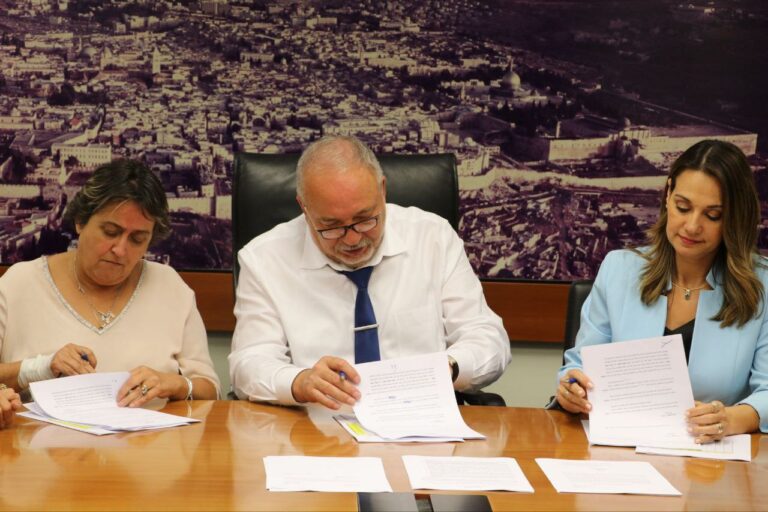
A new salary agreement signed in late October between the government and the Teachers’ Union is set to improve teachers salaries significantly, with an increase of 6.5-7% for veteran teachers and 30% for young teachers. However, teachers have a mixed response on how meaningful the change will be.
“Whoever expected that this agreement is going to change the education system, does not understand what a salary agreement is,” said Eitan Mandelbaum, a middle school teacher in Rehovot with 13 years of experience.
Mandelbaum continued that “this does not increase the purchasing power of the teachers, because the salary increase does not equal the general price increase in the economy.”
This new agreement is the culmination of months of mass protest and striking, with the Teachers’ Union and Finance Ministry coming to an agreement in late August just before the start of the new school year. Along with wage increases, the initial agreement included clauses regarding incentivizing excellence, layoff policies and vacation days, much of which has yet to be clarified in finalized agreements.
While making some teachers feel positive about a better future, the salary agreement has simultaneously brought to the surface old tensions and hardships that exist in the education system, and that have not been resolved or addressed in this agreement.
Amir Shefer, an assistant principal from Jerusalem, points out the increase in the various rewards as a positive achievement in the agreement.
"Increasing the reward for classroom education, or recognizing the integration of students from special education as a reward are very good and important achievements,” he said.
Aviv Weisblatt, a kindergarten teacher for six years in Givatayim, has mixed feelings towards the new agreement.
"I don't think it will bring new kindergarten teachers in the coming years, but it's always good to have a little more in mind," she said.
All three teachers describe mixed feelings for the agreement among their colleagues as well. For Mandelbaum, this is a positive sign.
"I hear complaints from young and old teachers alike," he said. "That's how I know the agreement is balanced from the point of view of the entire teaching public.”

"I know that the experienced kindergarten teachers are disappointed by the agreement,” Weisblatt said. “My friends think like me, the salary increase is nice, but the taste is sour, as if we always have to settle for less.”
The feeling of ambiguity was experienced among many teachers until the signing of the agreement was reached. However many continue to feel a sense of ambivalence.
"Teachers are waiting to see their paycheck in practice," Shefer said.
"There is still a sense of uncertainty,” Weisblatt added. “My concern is that the teachers' union emphasizes only the achievements.”
The teaching staff don't yet know how this agreement affects them personally and what their new salaries will be. Mandelbaum says that “even with the new agreement, I probably won't be able to take out a mortgage.”
“I am a deputy principal and I have not yet seen a direct reference to my salary,” Shefer said. “I assume it will be somewhere between the principal's salary and the teachers’ salary, as I am one foot here and one foot there.”
The work has just begun
All three are not sure that the agreement will contribute to the recruitment of new teachers.
"I don't think that new kindergarten teachers will join in the coming years, because teachers still have a relatively low wage in the economy," Weisblatt said.
"I assume that teachers will come following the salary increase, but it is clear that if the salary increase went up to 15,000 shekels ($4,390), the school principals would have more choice," Shefer added.
At the same time, they point to two principles that promote the entry of new teachers into the system: the retention grant, which will be given to teachers who commit to teaching for three years minimum, and establishing a quota for new teachers to be hired in schools. According to Mandelbaum, “the agreement tries to deal with the phenomenon that the Ministry of Education does not increase the job percentage of the young teachers."
In 2007 the Israeli government implemented the Ofek Chadash (New Horizon) reform which was a national program to advance education in Israel in elementary and junior high schools. It included things such as boosting teachers salaries and expanding the authority power of the school principal. Mandelbaum points out that the problems that were created from Ofek Chadash were not adequately addressed in the new agreement, stating things such as sick leave and pension were addressed.
Shafer and Weisblatt both point out the importance of the struggle itself, but differ in opinion on the results of the agreement.
"The teacher's status has risen, and the public understands the power of teachers," Shefer said, but Weisblatt thinks that public recognition has not been achieved.
"I'm glad they listened to us. It required being loud, but perhaps there is no other way in this country,” Weisblatt said. “Because despite our struggle, there is no public awareness about the entitlements of education and care workers like us, or knowledge of what is an adequate and proper wage."
Weisblatt says that despite everything, she is interested in teaching inside the public education system.
"My kindergarten is an anthroposophic kindergarten in the public education system,” she said. “I can manage a kindergarten in the private education sector and earn much more, but I believe in a public education system.”
This article was translated from Hebrew by Nancye Kochen.






